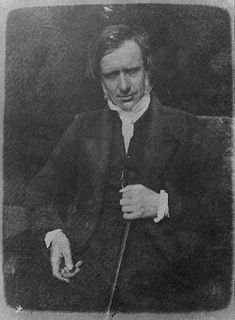A Quote by Solomon Caesar Malan
In Nature everything has a meaning; that is, every object is exactly adapted to the place it occupies, and to the purpose for which it was made.
Related Quotes
Ethics occupies a central place in philosophy because it is concerned with sin, with the origin of good and evil and with moral valuations. And since these problems have a universal significance, the sphere of ethics is wider than is generally supposed. It deals with meaning and value and its province is the world in which the distinction between good and evil is drawn, evaluations are made and meaning is sought.
A natural talent is required; for, when Nature opposes, everything else is in vain; but when Nature leads the way to what is most excellent, instruction in the art takes place, which the student must try to appropriate to himself by reflection, becoming an early pupil in a place well adapted for instruction. He must also bring to the task a love of labor and perseverance, so that the instruction taking root may bring forth proper and abundant fruits.
We see that God has implanted in all things a natural desire to exist with the fullest measure of existence that is compatible with their particular nature. To this end they are endowed with suitable faculties and activities; and by means of these there is in them a discernment that is natural and in keeping with the purpose of their knowledge, which ensures their natural inclination serving its purpose and being able to reach its fulfilment in that object towards which it is attracted by the weight of its own nature.
We say then, that Christianity is adapted to the intellect, because its spirit coincides with that of true philosophy; because it removes the incubus of sensuality and low vice; because of the place it gives to truth; because it demands free inquiry; because its mighty truths and systems are brought before the mind in the same way as the truths and systems of nature; because it solves higher problems than nature can; and because it is so communicated as to be adapted to every mind.
Every little thing has a purpose, at the same time, it has no purpose because this whole thing is a game. It is the existence which is total, beyond purpose. So you can say, virtually there is no purpose. If at all you have to pin down to a purpose then the purpose of nature is to take you to the Source, is to remind you of the Source, connect you to your Source.
The longer I live, the more it grieves me to see man, who occupies his supreme place for the very purpose of imposing his will upon nature, and freeing himself and his from an outrageous necessity--to see him taken up with some false notion, and doing just the opposite of what he wants to do; and then, because the whole bent of his mind is spoilt, bungling miserably over everything.
Every object in nature is impressed with God's footsteps, and every day repeats the wonders of creation. There is not an object, be it pebble or pearl, weed or rose, the flower-spangled sward beneath, or the star-spangled sky above, not a worm or an angel, a drop of water or a boundless ocean, in which intelligence may not discern, and piety adore, the providence of Him who took our nature that He might save our souls.
In the biblical worldview, the purpose of all creation is to benefit man. This anthropocentric view of nature, and indeed of the whole universe, is completely at odds with the current secular idealization of nature. This secular view posits that nature has its own intrinsic meaning and purpose, independent of man.
I used to fall hard when I was younger, and it occupies a lot of journals and redundant preoccupation and analysis. It is a state in which you are in an overheated fervor of production - of mental production - where you're analyzing everything that happened. And what they said! And how they looked! Did that touch mean something, or not? Everything is sort of endowed with meaning, but you're also hopelessly boring and out of the world.
Thought is not what inhabits a certain conduct and gives it its meaning; rather, it is what allows one to step back from this way of acting or reacting, to present it to oneself as an object of thought and to question it as to its meaning, its conditions, and its goals. Thought is freedom in relation to what one does, the motion by which one detaches from it, establishes it as an object, and reflects on it as a problem.
































